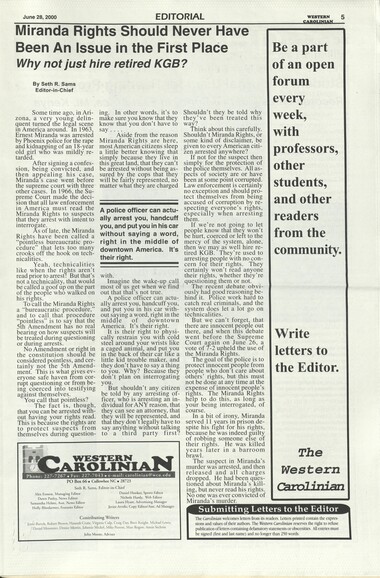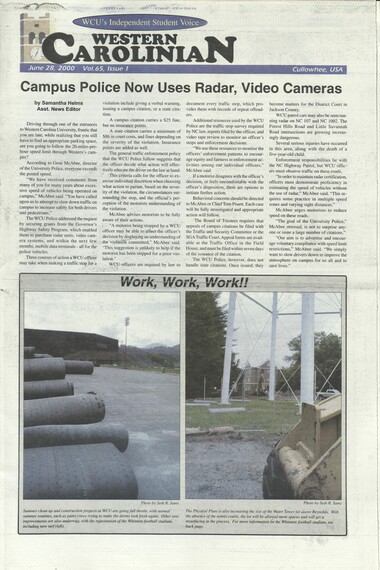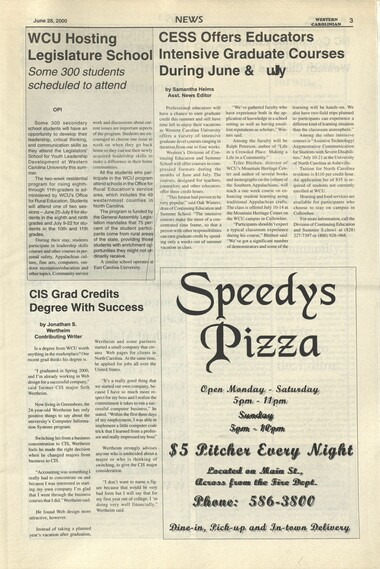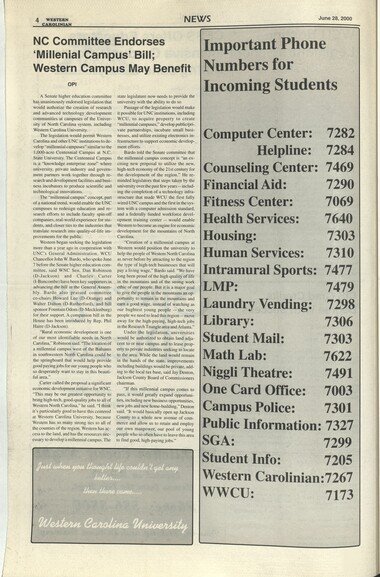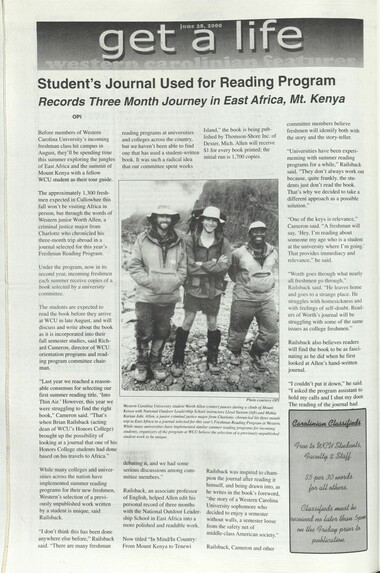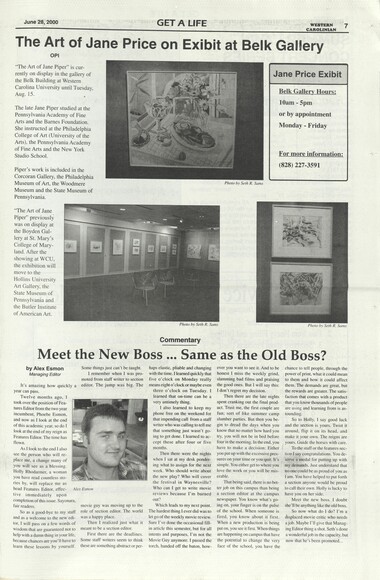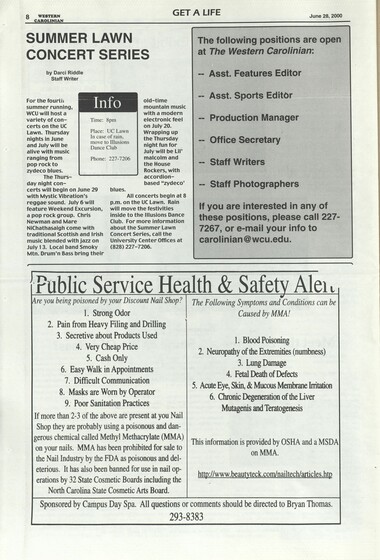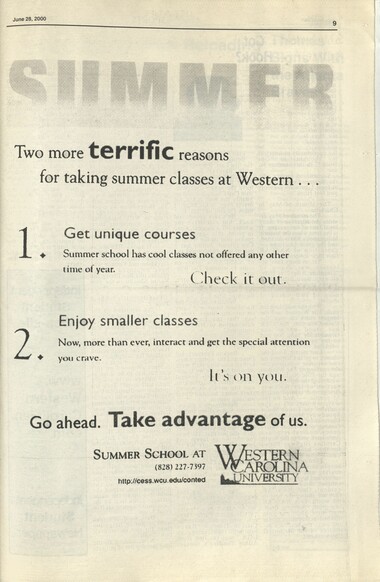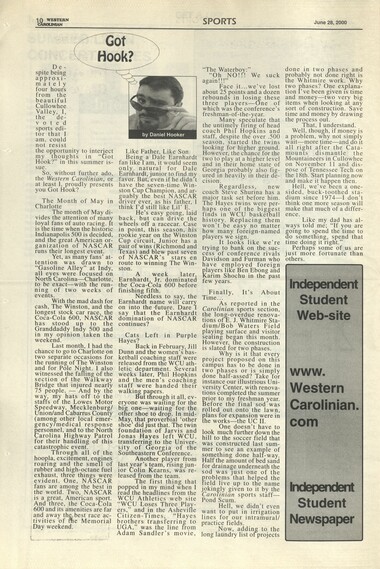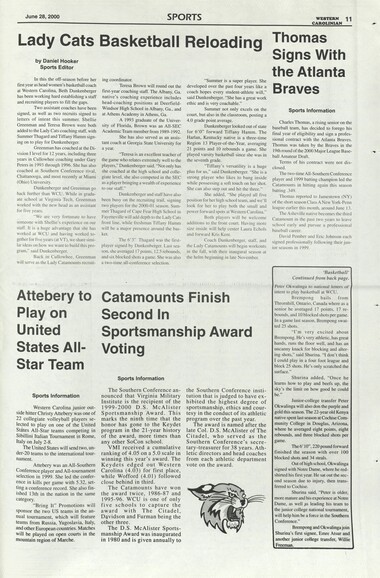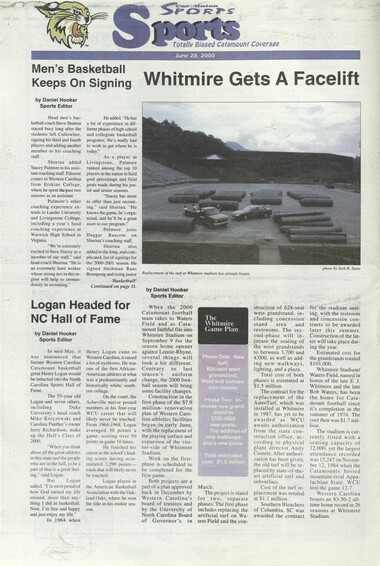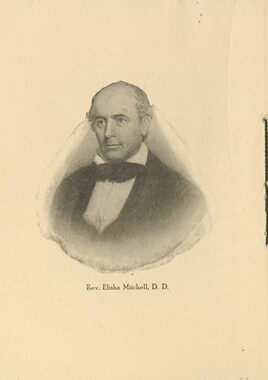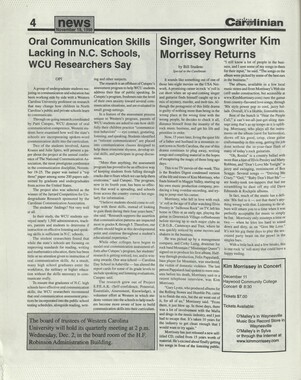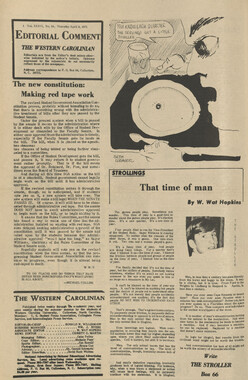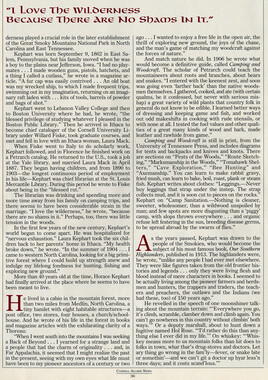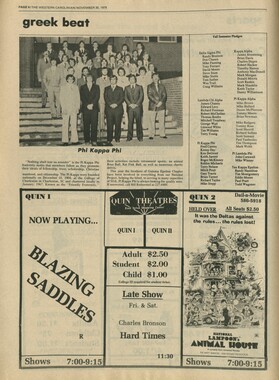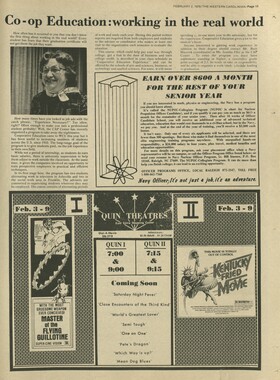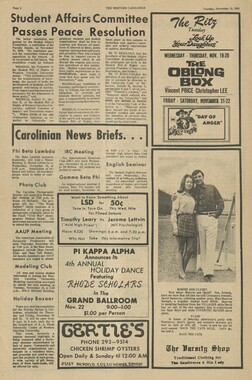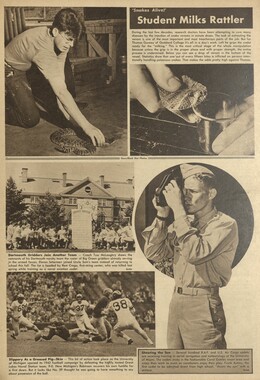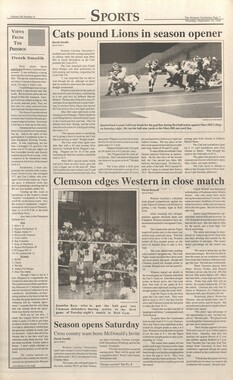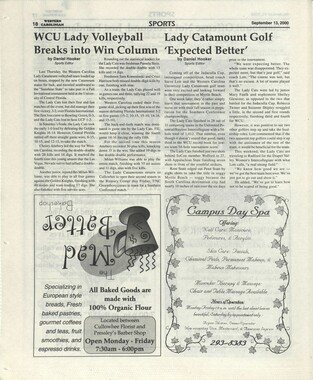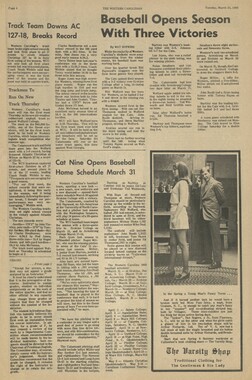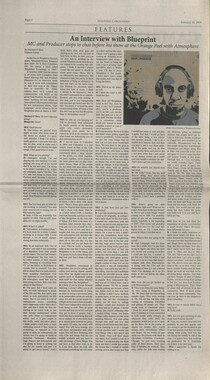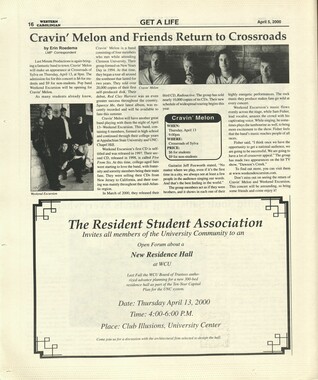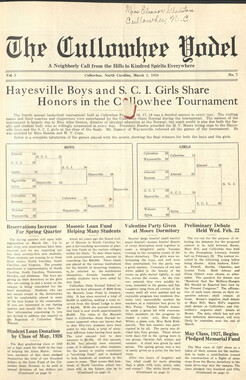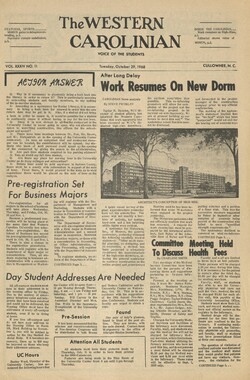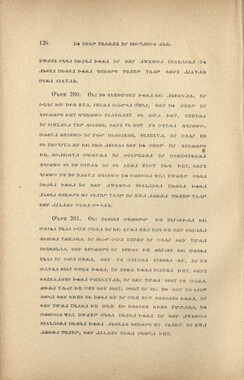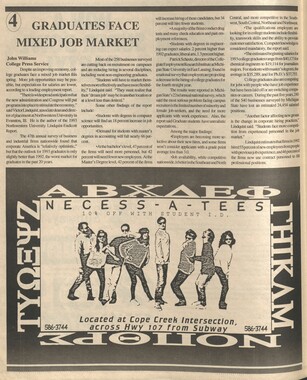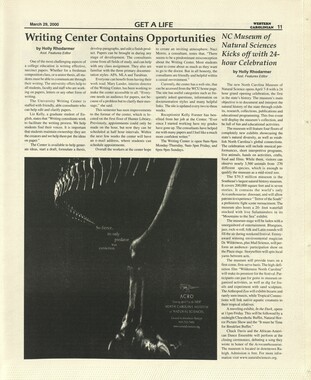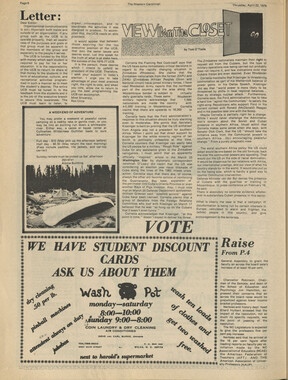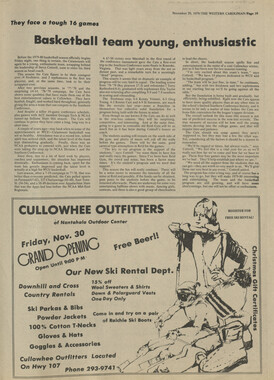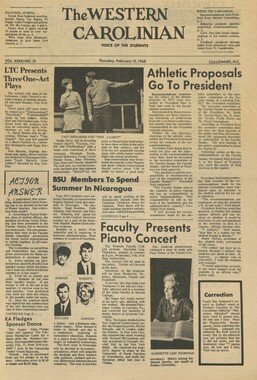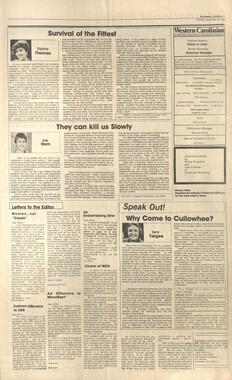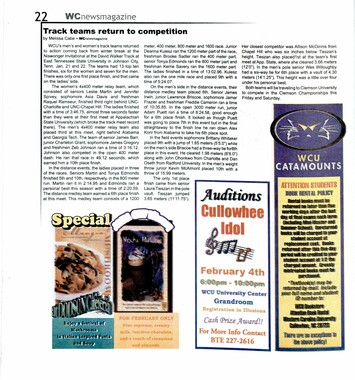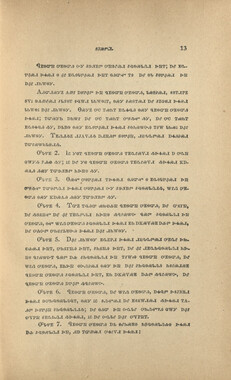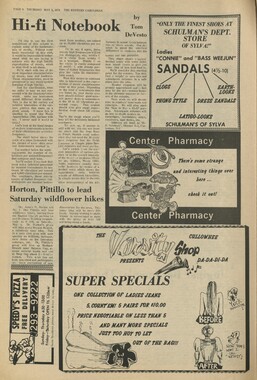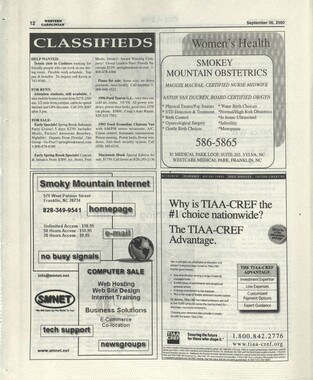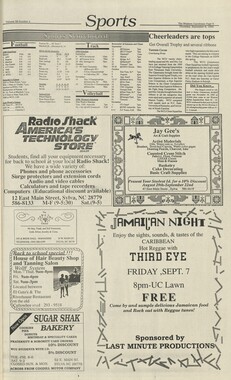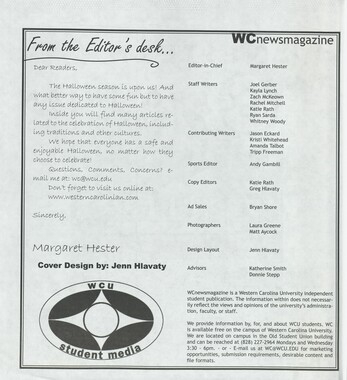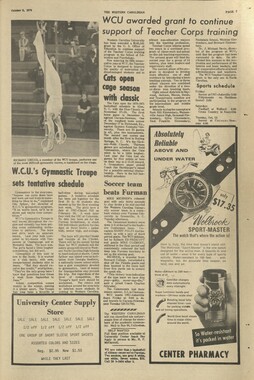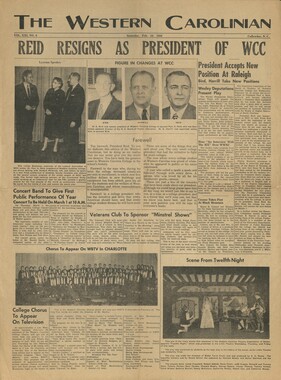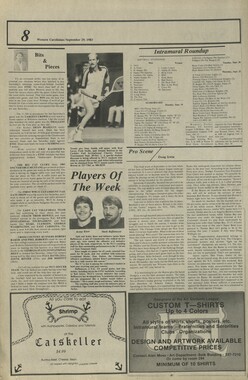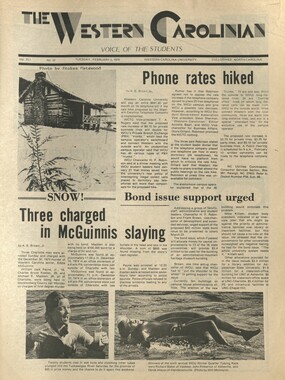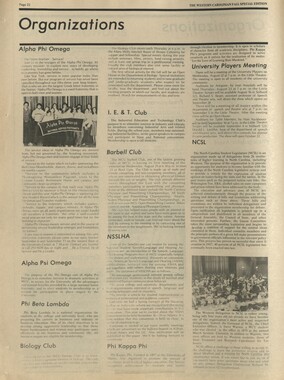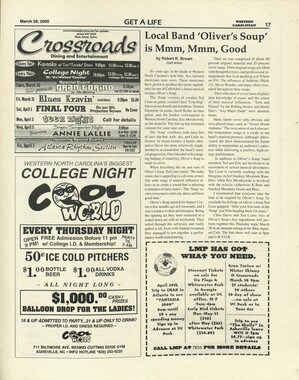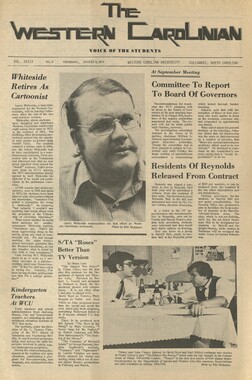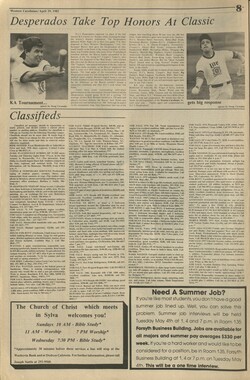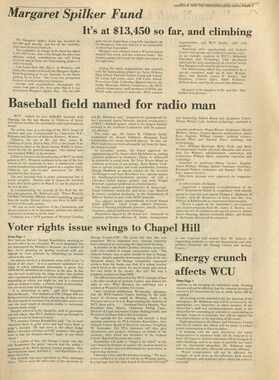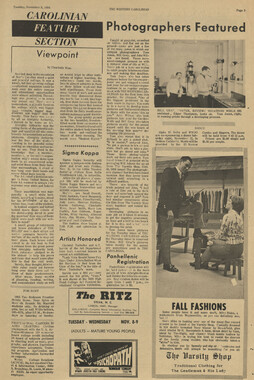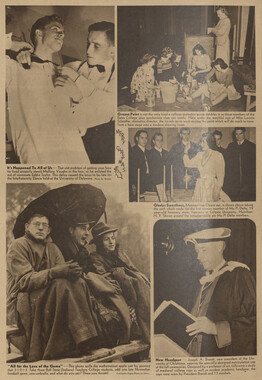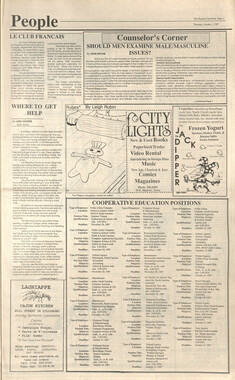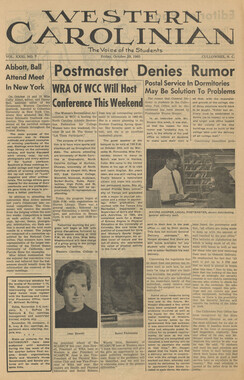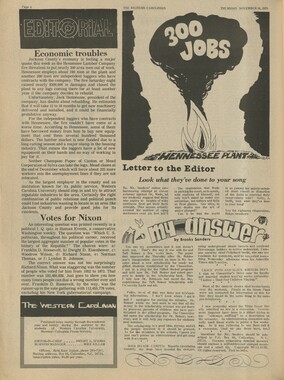Western Carolina University (21)
View all
- Canton Champion Fibre Company (2308)
- Cherokee Traditions (291)
- Civil War in Southern Appalachia (165)
- Craft Revival (1942)
- George Masa Collection (137)
- Great Smoky Mountains - A Park for America (2900)
- Highlights from Western Carolina University (422)
- Horace Kephart (941)
- Journeys Through Jackson (159)
- LGBTQIA+ Archive of Jackson County (85)
- Oral Histories of Western North Carolina (314)
- Picturing Appalachia (6797)
- Stories of Mountain Folk (413)
- Travel Western North Carolina (153)
- Western Carolina University Fine Art Museum Vitreograph Collection (129)
- Western Carolina University Herbarium (92)
- Western Carolina University: Making Memories (738)
- Western Carolina University Publications (2491)
- Western Carolina University Restricted Electronic Theses and Dissertations (146)
- Western North Carolina Regional Maps (71)
- World War II in Southern Appalachia (131)
University of North Carolina Asheville (6)
View all
- Allanstand Cottage Industries (62)
- Appalachian National Park Association (53)
- Bennett, Kelly, 1890-1974 (1463)
- Berry, Walter (76)
- Brasstown Carvers (40)
- Carver, George Washington, 1864?-1943 (26)
- Cathey, Joseph, 1803-1874 (1)
- Champion Fibre Company (233)
- Champion Paper and Fibre Company (297)
- Cherokee Indian Fair Association (16)
- Cherokee Language Program (22)
- Crowe, Amanda (40)
- Edmonston, Thomas Benton, 1842-1907 (7)
- Ensley, A. L. (Abraham Lincoln), 1865-1948 (275)
- Fromer, Irving Rhodes, 1913-1994 (70)
- George Butz (BFS 1907) (46)
- Goodrich, Frances Louisa (120)
- Grant, George Alexander, 1891-1964 (96)
- Heard, Marian Gladys (60)
- Kephart, Calvin, 1883-1969 (15)
- Kephart, Horace, 1862-1931 (313)
- Kephart, Laura, 1862-1954 (39)
- Laney, Gideon Thomas, 1889-1976 (439)
- Masa, George, 1881-1933 (61)
- McElhinney, William Julian, 1896-1953 (44)
- Niggli, Josephina, 1910-1983 (10)
- North Carolina Park Commission (105)
- Osborne, Kezia Stradley (9)
- Owens, Samuel Robert, 1918-1995 (11)
- Penland Weavers and Potters (36)
- Roberts, Vivienne (15)
- Roth, Albert, 1890-1974 (142)
- Schenck, Carl Alwin, 1868-1955 (1)
- Sherrill's Photography Studio (2565)
- Southern Highland Handicraft Guild (127)
- Southern Highlanders, Inc. (71)
- Stalcup, Jesse Bryson (46)
- Stearns, I. K. (213)
- Thompson, James Edward, 1880-1976 (226)
- United States. Indian Arts and Crafts Board (130)
- USFS (683)
- Vance, Zebulon Baird, 1830-1894 (1)
- Weaver, Zebulon, 1872-1948 (58)
- Western Carolina College (230)
- Western Carolina Teachers College (282)
- Western Carolina University (2008)
- Western Carolina University. Mountain Heritage Center (18)
- Whitman, Walt, 1819-1892 (10)
- Wilburn, Hiram Coleman, 1880-1967 (73)
- Williams, Isadora (3)
- Cain, Doreyl Ammons (0)
- Crittenden, Lorraine (0)
- Rhodes, Judy (0)
- Smith, Edward Clark (0)
- Appalachian Region, Southern (2924)
- Asheville (N.C.) (1941)
- Avery County (N.C.) (26)
- Blount County (Tenn.) (195)
- Buncombe County (N.C.) (1672)
- Cherokee County (N.C.) (283)
- Clay County (N.C.) (556)
- Graham County (N.C.) (236)
- Great Smoky Mountains National Park (N.C. and Tenn.) (525)
- Haywood County (N.C.) (3569)
- Henderson County (N.C.) (70)
- Jackson County (N.C.) (4913)
- Knox County (Tenn.) (35)
- Knoxville (Tenn.) (13)
- Lake Santeetlah (N.C.) (10)
- Macon County (N.C.) (420)
- Madison County (N.C.) (215)
- McDowell County (N.C.) (39)
- Mitchell County (N.C.) (135)
- Polk County (N.C.) (35)
- Qualla Boundary (982)
- Rutherford County (N.C.) (76)
- Swain County (N.C.) (2182)
- Transylvania County (N.C.) (270)
- Watauga County (N.C.) (12)
- Waynesville (N.C.) (86)
- Yancey County (N.C.) (72)
- Aerial Photographs (3)
- Aerial Views (60)
- Albums (books) (4)
- Articles (1)
- Artifacts (object Genre) (228)
- Bibliographies (1)
- Biography (general Genre) (2)
- Cards (information Artifacts) (38)
- Clippings (information Artifacts) (191)
- Copybooks (instructional Materials) (3)
- Crafts (art Genres) (622)
- Depictions (visual Works) (21)
- Design Drawings (1)
- Drawings (visual Works) (185)
- Envelopes (73)
- Exhibitions (events) (1)
- Facsimiles (reproductions) (1)
- Fiction (general Genre) (4)
- Financial Records (12)
- Fliers (printed Matter) (67)
- Glass Plate Negatives (381)
- Guidebooks (2)
- Internegatives (10)
- Interviews (815)
- Land Surveys (102)
- Letters (correspondence) (1013)
- Manuscripts (documents) (618)
- Maps (documents) (177)
- Memorandums (25)
- Minutes (administrative Records) (59)
- Negatives (photographs) (6090)
- Newsletters (1290)
- Newspapers (2)
- Notebooks (8)
- Occupation Currency (1)
- Paintings (visual Works) (1)
- Pen And Ink Drawings (1)
- Periodicals (193)
- Personal Narratives (10)
- Photographs (12976)
- Plans (maps) (1)
- Poetry (5)
- Portraits (4568)
- Postcards (329)
- Programs (documents) (181)
- Publications (documents) (2443)
- Questionnaires (65)
- Relief Prints (26)
- Sayings (literary Genre) (1)
- Scrapbooks (282)
- Sheet Music (2)
- Slides (photographs) (402)
- Songs (musical Compositions) (2)
- Sound Recordings (796)
- Specimens (92)
- Speeches (documents) (18)
- Tintypes (photographs) (8)
- Transcripts (322)
- Video Recordings (physical Artifacts) (23)
- Text Messages (0)
- A.L. Ensley Collection (275)
- Appalachian Industrial School Records (7)
- Appalachian National Park Association Records (336)
- Axley-Meroney Collection (2)
- Bayard Wootten Photograph Collection (20)
- Bethel Rural Community Organization Collection (7)
- Blumer Collection (5)
- C.W. Slagle Collection (20)
- Canton Area Historical Museum (2110)
- Carlos C. Campbell Collection (462)
- Cataloochee History Project (64)
- Cherokee Studies Collection (4)
- Daisy Dame Photograph Album (5)
- Daniel Boone VI Collection (1)
- Doris Ulmann Photograph Collection (112)
- Elizabeth H. Lasley Collection (1)
- Elizabeth Woolworth Szold Fleharty Collection (4)
- Frank Fry Collection (95)
- George Masa Collection (173)
- Gideon Laney Collection (452)
- Hazel Scarborough Collection (2)
- Hiram C. Wilburn Papers (28)
- Historic Photographs Collection (236)
- Horace Kephart Collection (861)
- Humbard Collection (33)
- Hunter and Weaver Families Collection (1)
- I. D. Blumenthal Collection (4)
- Isadora Williams Collection (4)
- Jesse Bryson Stalcup Collection (47)
- Jim Thompson Collection (224)
- John B. Battle Collection (7)
- John C. Campbell Folk School Records (80)
- John Parris Collection (6)
- Judaculla Rock project (2)
- Kelly Bennett Collection (1482)
- Love Family Papers (11)
- Major Wiley Parris Civil War Letters (3)
- Map Collection (12)
- McFee-Misemer Civil War Letters (34)
- Mountain Heritage Center Collection (4)
- Norburn - Robertson - Thomson Families Collection (44)
- Pauline Hood Collection (7)
- Pre-Guild Collection (2)
- Qualla Arts and Crafts Mutual Collection (12)
- R.A. Romanes Collection (681)
- Rosser H. Taylor Collection (1)
- Samuel Robert Owens Collection (94)
- Sara Madison Collection (144)
- Sherrill Studio Photo Collection (2558)
- Smoky Mountains Hiking Club Collection (616)
- Stories of Mountain Folk - Radio Programs (374)
- The Reporter, Western Carolina University (510)
- Venoy and Elizabeth Reed Collection (16)
- WCU Gender and Sexuality Oral History Project (32)
- WCU Mountain Heritage Center Oral Histories (25)
- WCU Oral History Collection - Mountain People, Mountain Lives (71)
- WCU Students Newspapers Collection (1923)
- Western North Carolina Tomorrow Black Oral History Project (69)
- William Williams Stringfield Collection (2)
- Zebulon Weaver Collection (109)
- African Americans (390)
- Appalachian Trail (35)
- Artisans (521)
- Cherokee art (84)
- Cherokee artists -- North Carolina (10)
- Cherokee language (21)
- Cherokee pottery (101)
- Cherokee women (208)
- Church buildings (190)
- Civilian Conservation Corps (U.S.) (111)
- College student newspapers and periodicals (2012)
- Dams (107)
- Dance (1023)
- Education (222)
- Floods (61)
- Folk music (1015)
- Forced removal, 1813-1903 (2)
- Forest conservation (220)
- Forests and forestry (1196)
- Gender nonconformity (4)
- Great Smoky Mountains National Park (N.C. and Tenn.) (181)
- Hunting (45)
- Landscape photography (25)
- Logging (119)
- Maps (83)
- Mines and mineral resources (8)
- North Carolina -- Maps (18)
- Paper industry (38)
- Postcards (255)
- Pottery (135)
- Railroad trains (72)
- Rural electrification -- North Carolina, Western (3)
- School integration -- Southern States (2)
- Segregation -- North Carolina, Western (5)
- Slavery (5)
- Sports (452)
- Storytelling (243)
- Waterfalls -- Great Smoky Mountains (N.C. and Tenn.) (66)
- Weaving -- Appalachian Region, Southern (280)
- Wood-carving -- Appalachian Region, Southern (328)
- World War, 1939-1945 (173)
Western Carolinian Volume 65 (66) Number 01
Item
Item’s are ‘child’ level descriptions to ‘parent’ objects, (e.g. one page of a whole book).
-
-
June 28, 2000 EDITORIAL Miranda Rights Should Never Have Been An Issue in the First Place Why not just hire retired KGB? WESTERN 5 CAROLINIAN By Seth R. Sams Editor-in-Chief Some time ago, in Arizona, a very young delinquent turned the legal scene in America around. In 1963, Ernest Miranda was arrested by Phoenix police for the rape and kidnapping of an 18-year old girl who was mildly retarded. After signing a confession, being convicted, and then appealing his case, Miranda s case went before the supreme court with three other cases. In 1966, the Supreme Court made the decision that all law enforcement in America must read the Miranda Rights to suspects that they arrest with intent to interrogate. As of late, the Miranda Rights have been called a "pointless bureaucratic procedure" that lets too many crooks off the hook on technicalities. Yeah, technicalities like when the rights aren't read prior to arrest! But that's not a technicality, that would be called a goof up on the part of the people who walked on his rights. To call the Miranda Rights a "bureaucratic procedure," and to call that procedure "pointless" is to say that the 5th Amendment has no real bearing on how suspects will be treated during questioning or during arrests. No Amendment or right in the constitution should be considered pointless, and certainly not the 5th Amendment. This is what gives everyone safe haven from corrupt questioning or from being coerced into testifying against themselves. You call that pointless? The fact is, though, that you can be arrested without having your rights read. This is because the rights are to protect suspects from themselves during question ing. In other words, it's to make sure you know that they know that you don't have to say .... Aside from the reason Miranda Rights are here, most American citizens sleep a little better knowing that simply because they live in this great land, that they can't be arrested without being assured by the cops that they will be fairly represented, no matter what they are charged A police officer can actually arrest you, handcuff you, and put you in his car without saying a word, right in the middle of downtown America. It's their right. with. Imagine the wake-up call most or us get when we find out that that's not true. A police officer can actually arrest you, handcuff you, and put you in his car without saying a word, right in the middle of downtown America. It's their right. It is their right to physically restrain you with cold steel around your wrists like a caged animal, and put vou in the back of their car like a little kid trouble maker, and they don't have to say a thing to you. Why? Because they don't plan on interrogating you. But shouldn't any citizen be told by any arresting officer, who is arresting an individual for ANY reason, that they can see an attorney, that they will be represented, and that they don't legally have to say anything without talking to a third party first? ' 'Carol'in i AJ* Phone: 227-7267 • Fax: 227-7043 • e-mail: carolinian^wcu.edu PO Box 66 • Cullowhee NC • 28723 Seth R. Sams. Editor-in-Chief Alex l-Ainon, Managing Editor Daniel Hooker, Sports Editor Dawn Pasley, News Editor Samantha Helms, Asst. News Editor Hollv Rhodarmer. Features Editor Nichole Hardy, Web Editor Laura Hyatt, Advertising Manager Javier Arvelo, Copy Editor/Asst. Ad Manage Contributing Writers [enfti Bands, Robert Brown, Hannah Crane, Virginia Culp, Craig Day, Brett Knight. Michael Lewis, / Daniel Menestres. Denise Merrirt, Johnnie Mickel, Mike Boston, Man Rogers, Annie Sechrisi I |ohn Moore, Adviser Shouldn't they be told why they've been treated this way? Think about this carefully. Shouldn't Miranda Rights, or some kind of disclaimer, be given to every American citizen arrested anywhere? If not for the suspect then simply for the protection of the police themselves. All aspects of society are or have )een at some point corrupted, ^aw enforcement is certainly no exception and should protect themselves from being accused of corruption by respecting everyone's rights, especially when arresting them. If we're not going to let Eeople know that they won't e hurt, coerced or left to the mercy of the system, alone, then we may as well hire retired KGB. They're used to arresting people with no concern for their rights. They certainly won't read anyone their rights, whether they're questioning them or not. The recent debate obviously had good reasoning be- hindit. Police work hard to catch real criminals, and the system does let a lot go on technicalities. But we can't forget, that there are innocent people out there, and when this debate went before the Supreme Court again on June 26, a vote of 7-2 upheld the use of the Miranda Rights. The goal of the police is to protect innocent people from people who don't care about others' rights, but this must not be done at any time at the expense of innocent people's rignts. The Miranda Rights help to do this, as long as your being interrogated, of course. In a bit of irony, Miranda served 11 years in prison despite his fight for his rights, because he was indeed guilty of robbing someone else of their rights. He was killed years later in a barroom brawl. The suspect in Miranda's murder was arrested, and then released and all charges dropped. He had been questioned about Miranda's killing, but never read his rights. No one was ever convicted of Miranda's murder. Be a part of an open forum every week, with professors, other students, and other readers from the community. Write letters to the Editor. The Submitting Letters to the Editor The Carolinian welcomes letters from its readers. Letters printed contain the expressions and values of their authors. The Western Carolinian reserves the right to refuse publication of letters containing defamatory statements or obscenities. All entries must be signed (first and last name) and no longer than 250 words.
Object
Object’s are ‘parent’ level descriptions to ‘children’ items, (e.g. a book with pages).
-
The Western Carolinian is Western Carolina University's student-run newspaper. The paper was published as the Cullowhee Yodel from 1924 to 1931 before changing its name to The Western Carolinian in 1933.
-
